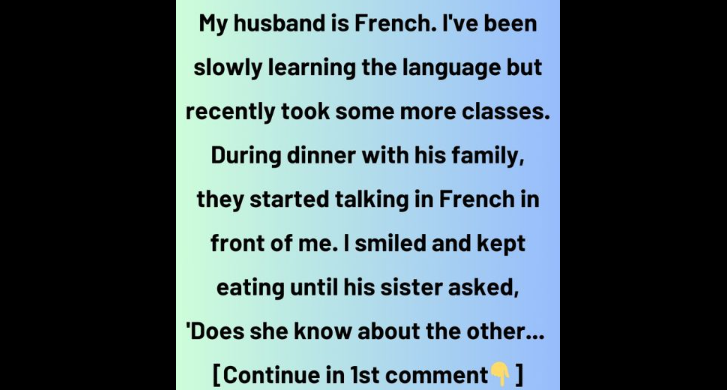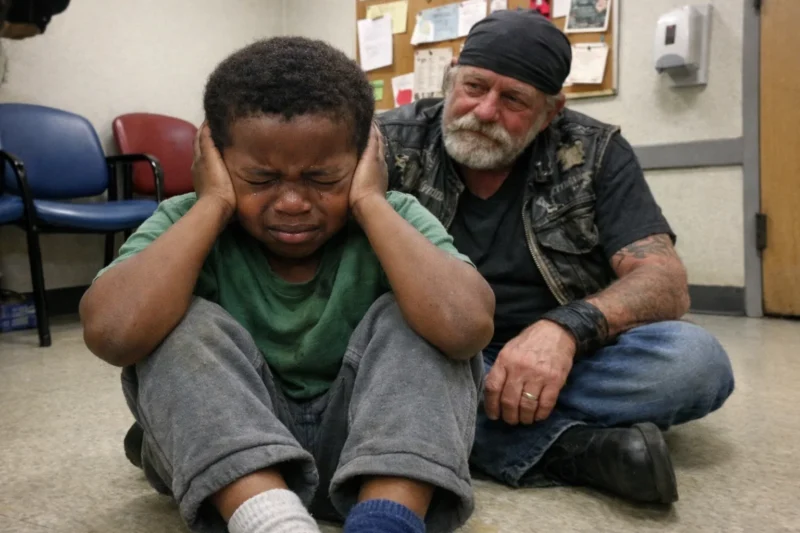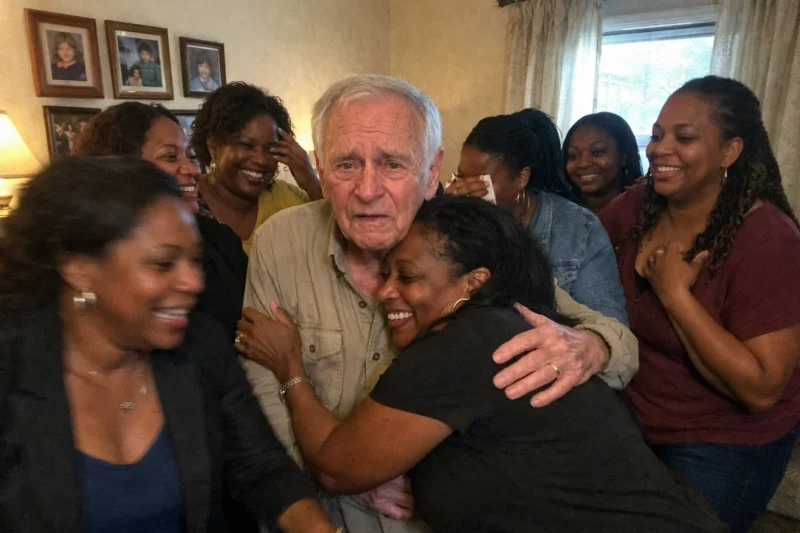My husband, Étienne, hails from France. I’ve been gradually picking up the language, recently enrolling in additional classes to deepen my understanding.
At a family dinner, his relatives began conversing in French around me. I smiled and continued with my meal until his sister, Maëlle, asked, “Elle sait pour l’autre…?”
The words lingered, heavy in the air. I stared into my bowl of bouillabaisse, hoping it might somehow clarify her meaning.
Maëlle had spoken so nonchalantly, as if checking if the dish needed more seasoning.
My entire body stiffened.
I watched Étienne closely for his response.
He avoided my gaze, chewing deliberately, then took a sip of wine before replying in rapid French I couldn’t fully grasp.
The word “non” stood out, accompanied by a fleeting glance my way, almost instinctive.
That night, sleep eluded me.
I lay awake, staring at the ceiling as Étienne slept soundly beside me.
My mind looped endlessly: Does she know about the other… what? A hidden property? A secret account? Another person?
I held my tongue initially.
It seemed too irrational to voice.
Yet, after nearly ten years of marriage, I could sense a subtle shift in the air.
The following day, I reached out to my friend Pilar.
She’s fluent in French—her mother is from Marseille—and works as a translator.
I kept the details vague, asking her to help me refine some phrases.
We met at a café the next week, and I asked her to assist with conversational listening skills.
I played her a discreet recording from the dinner, just the audio.
When Maëlle’s voice said, “Elle sait pour l’autre?”, Pilar’s eyes widened.
She tilted her head and said, “Hold on… l’autre as in l’autre femme? Like, ‘the other woman’?”
My throat closed up.
“Could it mean anything else?” I asked.
She gave a gentle shrug. “Possibly—a business associate, a second home, maybe a child. But her tone? I’d wager it’s something suspicious.”
I left my coffee untouched.
Nausea hit me hard.
At home, I tried to keep things normal.
Étienne prepared pasta and kissed my cheek.
I returned the kiss.
But something inside me had changed.
Two weeks later, his mother hosted another dinner.
The same group gathered—Maëlle, her partner Lucien, their baby, and Étienne’s parents.
I ensured my phone was charged and listened intently this time.
What caught me off guard was Lucien’s slip during dessert.
He leaned toward Étienne and mentioned “Léonie” with a teasing lilt, like sharing an inside joke.
Maëlle quickly elbowed him.
Étienne’s jaw clenched as he shook his head.
He swiftly pivoted, asking his father about their upcoming Bordeaux trip.
But now I had a name: Léonie.
When I was alone, I searched his phone.
I’m not proud of it.
But with a name like that burning in my mind, sitting still wasn’t an option.
No texts or calls were saved under “Léonie.”
But in his email archives, I found something.
An AirBnB booking from six months prior—two nights in Aix-en-Provence, reserved under her name.
He had paid for it.
I forwarded the email to myself.
Then I looked her up.
Léonie L. Florist. Twenty-eight years old.
Her Instagram was filled with flawless tulip arrangements and latte art.
One photo, posted two months ago, showed a man’s hand resting on her knee at a café.
The face wasn’t visible.
But I recognized that hand.
I didn’t confront him immediately.
I’m not one for shouting matches.
I needed time to process.
Instead, I took a solo retreat to the countryside.
I told Étienne it was for work—I’m a freelance editor, so disappearing with manuscripts wasn’t unusual.
In a borrowed cottage, I documented everything.
Every warning sign.
Every piece that now clicked into place.
I cried once, raw and unfiltered, then pulled myself together.
And then—I devised a plan.
Back home, I played the part.
Warm smiles, affectionate kisses, cheerful vibes.
I asked Étienne about his work, his deadlines.
I tucked notes into his packed lunches.
He seemed so at ease.
Like someone who believed they’d escaped unnoticed.
One day, I announced I had a surprise for him.
“Our tenth anniversary is approaching,” I said. “I wanted to make it special.”
His face brightened.
I handed him an envelope with a printed itinerary.
“Three nights in Aix-en-Provence,” I said. “I thought we should explore what’s so special about it.”
His face drained of color.
The next day, he claimed a work conflict prevented the trip.
That evening, I left his favorite wine, a thick stack of printed emails, and a note on the kitchen table.
Then I walked out.
Permanently? I wasn’t sure.
But I returned to the cottage, this time with no plans to return.
Two days went by.
No calls.
Then, a text arrived: “I’m sorry. I never meant to hurt you.”
That was all.
I expected fury or sorrow.
Instead, I felt… unburdened.
I didn’t respond.
Not yet.
Instead, I invited Pilar to the cottage for the weekend.
We drank wine, overcooked garlic, and talked like family.
By week’s end, I’d found a small sense of rhythm again.
Then, unexpectedly, Maëlle called.
I nearly ignored it.
But curiosity won out.
Her voice trembled. “I didn’t know it was still happening,” she said. “I thought it was over. Years ago.”
I went still. “Years?”
“Léonie was his intern when he launched the architecture firm. He swore it ended when you got pregnant… and after the miscarriage, I assumed…”
Her voice cracked. “I’m so sorry. I should’ve spoken up.”
I sank into a chair.
A whole history I hadn’t uncovered.
That night, I revisited the calendar.
I recalled the pregnancy.
The miscarriage.
The grief.
He was with her during that time?
It turned my stomach.
Then came something astonishing: a message from Léonie.
It was polite, almost formal.
She claimed she didn’t know he was still married, that he’d said we were separated.
I didn’t reply for days.
Then I sent one line: “Don’t trust anything he says unless it’s from his lawyer.”
And that was the end of it.
Six months later, the divorce was finalized.
No theatrics.
He didn’t contest it.
I kept the apartment.
And I held onto my peace.
But here’s where life takes a curious turn.
Post-divorce, I started a French-language book club in my neighborhood to keep my skills sharp.
It grew steadily—monthly meetings became biweekly, then weekly.
One evening, a woman named Inès joined.
She was warm, witty, with a rich, honeyed voice and a laugh that disarmed me.
We started chatting more—after meetings, over coffee, then on long walks.
She, too, was recently divorced.
We exchanged stories.
One night, I shared the full, unfiltered version of mine.
She listened without interrupting.
When I finished, she said, “You’re the first person I’ve met who speaks of betrayal without resentment.”
Her words made me realize it was true.
A few weeks later, we began dating.
It was unexpected but deeply authentic.
Last month, we traveled to Aix-en-Provence together.
Not to the same AirBnB, naturally—a fresh place.
We strolled hand in hand through sycamore-lined streets, sipped rosé late into the night, and watched elderly couples dance in the town square.
Under the café lights, she kissed me and said, “You’re not someone’s other. You’re the one.”
And I believed her.
Here’s what I’ve come to understand:
Sometimes, betrayal paves the way for unexpected gifts.
Sometimes, darkness fosters growth.
And sometimes, the things that shatter your heart create room for joy.
If you’ve been deceived, blindsided, or made to feel irrational—
You’re not.
You deserve more.
And more is waiting for you.
Thank you for reading.
If this resonated, share it. Someone out there might need these words. 💬💗




